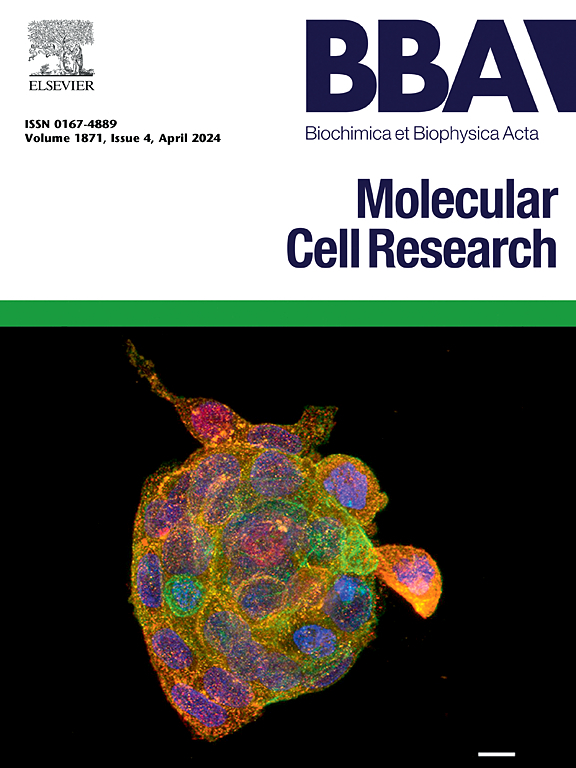Knockdown of translocon-associated protein subunit beta (TRAPβ) stimulates cell cycle arrest and apoptosis in human colorectal cancer cells
IF 3.7
2区 生物学
Q1 BIOCHEMISTRY & MOLECULAR BIOLOGY
Biochimica et biophysica acta. Molecular cell research
Pub Date : 2025-09-07
DOI:10.1016/j.bbamcr.2025.120057
引用次数: 0
Abstract
Translocon-associated protein subunit beta (TRAPβ), also known as signal sequence receptor 2 (SSR2) serves as an auxiliary protein facilitating co-translational translocation in the endoplasmic reticulum (ER); however, its role in colorectal cancer is unknown to date. The objectives of the current study are to examine if TRAPβ/SSR2 knockdown affects the cell proliferation and to elucidate mechanisms by which TRAPβ/SSR2 regulates proliferation of human colorectal cancer. We silenced TRAPβ/SSR2 transiently and stably in human colorectal cancer cell lines and analyzed cell proliferative properties. Transient transfection of TRAPβ/SSR2 siRNA significantly repressed the viability of five different types of human colorectal cancer cells. Flow cytometry and western blot showed that TRAPβ/SSR2 knockdown led to significant increase of G2/M-phase arrest in SW480 cells and S-phase arrest in HCT116 and DLD-1 cells. Annexin V-fluorescein isothiocyanate and propidium iodide staining showed that TRAPβ/SSR2 knockdown significantly induced apoptosis in SW480, HCT116, and DLD-1 cells. Similarly, SW480 stable cells with TRAPβ/SSR2 knockdown showed a significant inhibition of anchorage-independent cell growth, an increase of G2/M-phase arrest with downregulation of cyclin B1, and increase of apoptosis. Regarding mechanisms, TRAPβ/SSR2 knockdown mitigated epidermal growth factor-stimulated activation of mitogen-activated protein kinase (MAPK) pathways and showed significantly decreased expression of inositol-requiring enzyme 1 alpha (IRE1α), while IRE1α reintroduction in TRAPβ/SSR2 knockdown cells reversed G2/M-phase arrest and promoted cell cycle progression. All taken together, our data demonstrate that TRAPβ/SSR2 in the ER could be a molecular target to control cell cycle progression and apoptosis through MAPK-mediated and IRE1α-mediated pathways in human colorectal cancer cells.
trans - locon-associated protein subunit β (TRAPβ)的敲低刺激人类结直肠癌细胞的细胞周期阻滞和凋亡。
trans - loon -associated protein subunit β (TRAPβ),也被称为信号序列受体2 (SSR2),是一种辅助蛋白,促进内质网(ER)的共翻译易位;然而,它在结直肠癌中的作用至今尚不清楚。本研究的目的是检查TRAPβ/SSR2敲低是否影响细胞增殖,并阐明TRAPβ/SSR2调节人类结直肠癌增殖的机制。我们在人类结直肠癌细胞系中短暂稳定地沉默TRAPβ/SSR2,并分析细胞增殖特性。瞬时转染TRAPβ/SSR2 siRNA可显著抑制五种不同类型人结直肠癌细胞的活力。流式细胞术和western blot结果显示,TRAPβ/SSR2基因敲低导致SW480细胞的G2/ m期阻滞和HCT116和DLD-1细胞的s期阻滞显著增加。Annexin v -异硫氰酸荧光素和碘化丙啶染色显示,TRAPβ/SSR2敲低显著诱导SW480、HCT116和DLD-1细胞凋亡。同样,敲低TRAPβ/SSR2的SW480稳定细胞显示出锚定不依赖细胞生长的显著抑制,G2/ m期阻滞增加,cyclin B1下调,凋亡增加。机制方面,TRAPβ/SSR2敲低可减轻表皮生长因子刺激的有丝分裂原活化蛋白激酶(MAPK)通路的激活,并显著降低肌醇需要酶1α (IRE1α)的表达,而IRE1α在TRAPβ/SSR2敲低细胞中的重新引入逆转了G2/ m期阻滞,促进了细胞周期的进展。综上所述,我们的数据表明,内质网中的TRAPβ/SSR2可能是通过mapk介导和ire1 α介导的途径控制人类结直肠癌细胞周期进程和凋亡的分子靶点。
本文章由计算机程序翻译,如有差异,请以英文原文为准。
求助全文
约1分钟内获得全文
求助全文
来源期刊
CiteScore
10.00
自引率
2.00%
发文量
151
审稿时长
44 days
期刊介绍:
BBA Molecular Cell Research focuses on understanding the mechanisms of cellular processes at the molecular level. These include aspects of cellular signaling, signal transduction, cell cycle, apoptosis, intracellular trafficking, secretory and endocytic pathways, biogenesis of cell organelles, cytoskeletal structures, cellular interactions, cell/tissue differentiation and cellular enzymology. Also included are studies at the interface between Cell Biology and Biophysics which apply for example novel imaging methods for characterizing cellular processes.

 求助内容:
求助内容: 应助结果提醒方式:
应助结果提醒方式:


